Every dog owner knows what it’s like when your pet whines about something. The dog can be so annoying about something she wants.
She does it, of course, because she knows you’ll give in at some point. Sure enough, you do, almost every time.
When you know something is no good for your furry baby, you will not budge. For example, the dog may ask for chocolate, but you won’t budge.
What about apricots? You bought some at the farmer’s market today and left them at the kitchen counter.
The apricots smell great, and it seems like every family member took at least one. That made your dog feel jealous – she wants one, too.
Sure, if you knew that it was completely safe – you would have given it straight away. But, you’re not.
Can dogs eat apricots, ever? Is this safe food for your pet? How can you give an apricot to your pet? Read our article to find out!
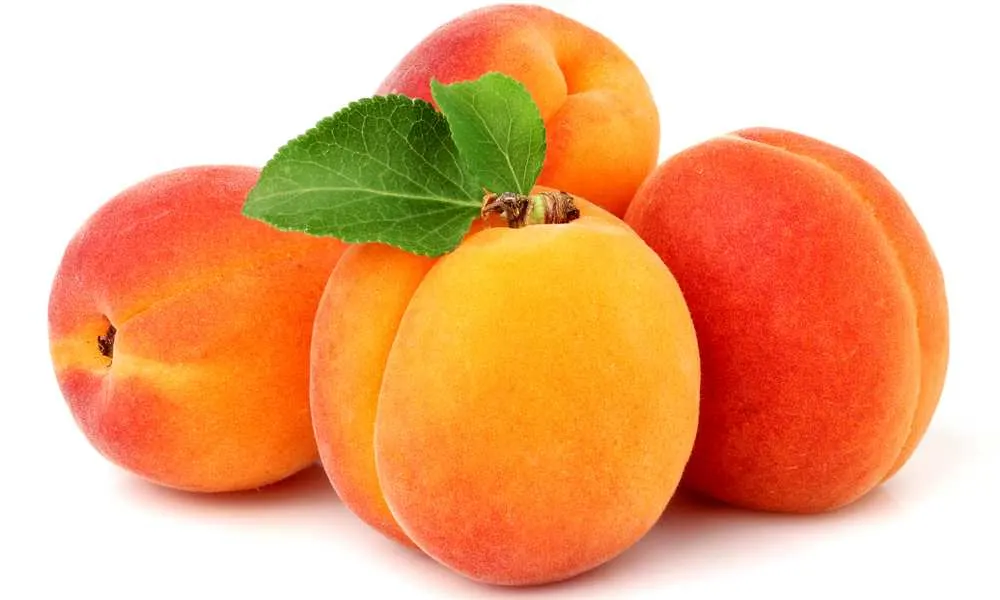
Can Dogs Eat Apricots?
Giving your pet anything she wants can result in the pet being spoiled. But what can you do – you just love to see her wagging her tail!
So, can you give the dog some apricots? The answer would be yes, yes you can! Apricots are perfectly safe for your pet! They can even offer some health benefits to your pup, too!
There are a few restrictions when it comes to apricots, and we’ll cover them all in this article. Also, make sure to introduce apricots to your pet’s diet before you start giving them more regularly.
Food sensitivity and allergies are real in dogs, just like humans. If you notice any unusual behavior, discontinue the use!
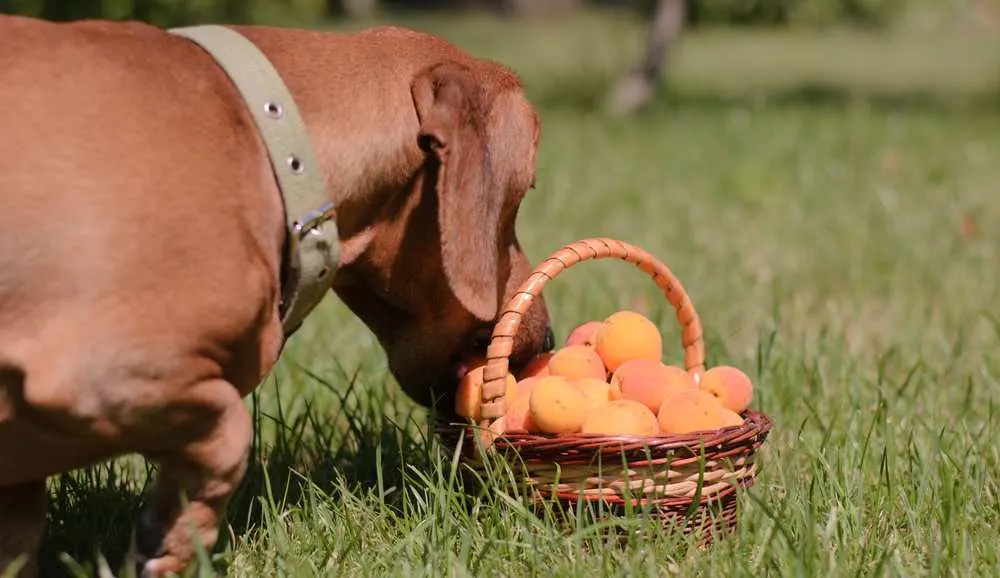
Introducing Apricots To Your Pet’s Diet
Introducing a new food item is a principal idea whenever you decide to give your pet anything new. It’s important for two reasons.
The first one would be because dogs tend to be put off by a new food. Especially if that food looks nothing like meat. Dogs may be omnivores in nature, but they require more meat than veggies and fruit to thrive.
The second reason would be to find out how your dog’s digestive system would react to a new food. They may not respond well due to sensitivity or allergies, and when you’re introducing a food, the dog is less likely to be harmed by this item.
So, how does one introduce food, exactly? Just take a small, tiny amount of the new food and give it to the pet.
You can mix it in the regular dog food, or you can sprinkle it on top. Next time, give the pet a little more, and next time some more. Increase the amount until you reach a full portion and that’s about it!
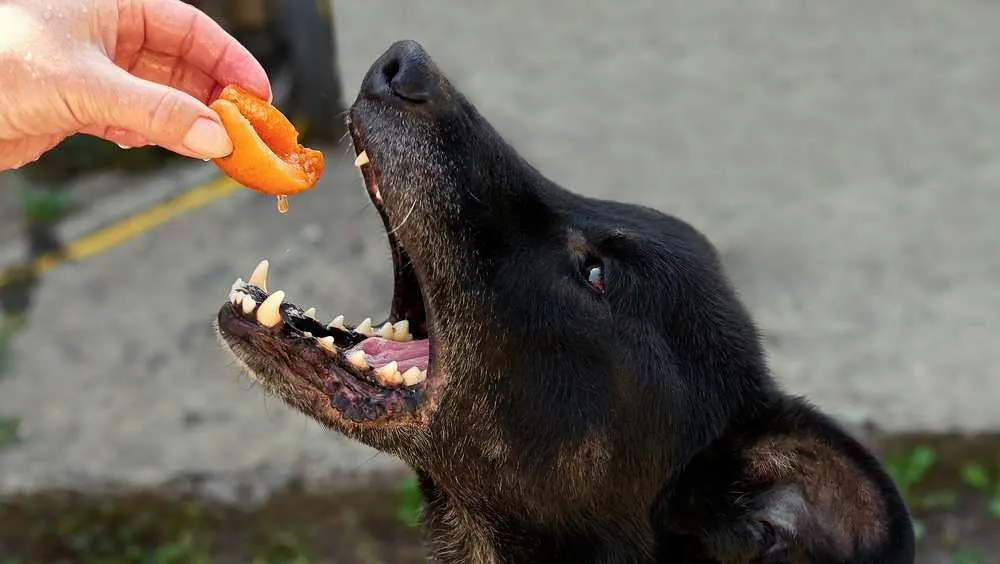
Serving Apricots To Your Pet
Serving apricots to your pet is a fairly easy job there are a few things to remember, though.
First, you can’t just give an apricot off the tree to your pet – that’s out of the question. You have to remember to remove any leaves, the pit, and the stem.
These parts of the apricot can contain cyanide. The amount of cyanide in apricots is not harmful to humans. However, it can seriously harm your pet.
Be careful and if you forget to remove any part – visit the emergency vet. It’s better to be safe than sorry!
Next, cut up the fruit in tiny bits. This is an important step as well, so make sure to chop the apricot up in bits small enough for your pet’s mouth.
If the dog gets excited she can forget to chew. If she ingests huge pieces, it can lead to vomiting and tummy woes. If the dog seems like she’s having tummy issues, visit the vet.
For the best results, mix the apricots in the regular dog food. The dog is less likely to be put off by apricots this way.
Dosing The Apricots According To The Dog Size
| Toy breeds | Small breeds | Medium Breeds | Large breeds |
|---|---|---|---|
| One small slice | One regular slice | Two regular slices | Up to half an apricot |
Do note that these amounts should be taken as the maximum allowed dose. The dog shouldn’t eat more than it says on the table.
Eating too many apricots can be harmful to your pet in many ways. We’ll talk more about it in the next sections of this article.
Also, keep apricots on the table as an occasional meal. Apricots are perfectly safe, but they should not be eaten regularly, because of the high carbohydrates count.
Dogs should eat a protein-rich diet, and that’s why dog food is the best way to go. Commercial dog food is balanced according to the pet’s dietary requirements.
You may be worried that the dog finds the same meal every day a little dull, but we assure you that’s not the case. Dogs simply don’t get bored by the same meal, ever!
If you want to let your pet know she’s loved and cared for, you can cook her a meal. She may not get the difference, but she appreciates the love!
Using Apricots As Treats
Can apricots make a tasty treat for your furry baby? Yes, apricots can make a great treat!
Just make sure to follow the 10% rule. The 10% rule states that the treats shouldn’t make over 10% of the daily food ingested by the pet.
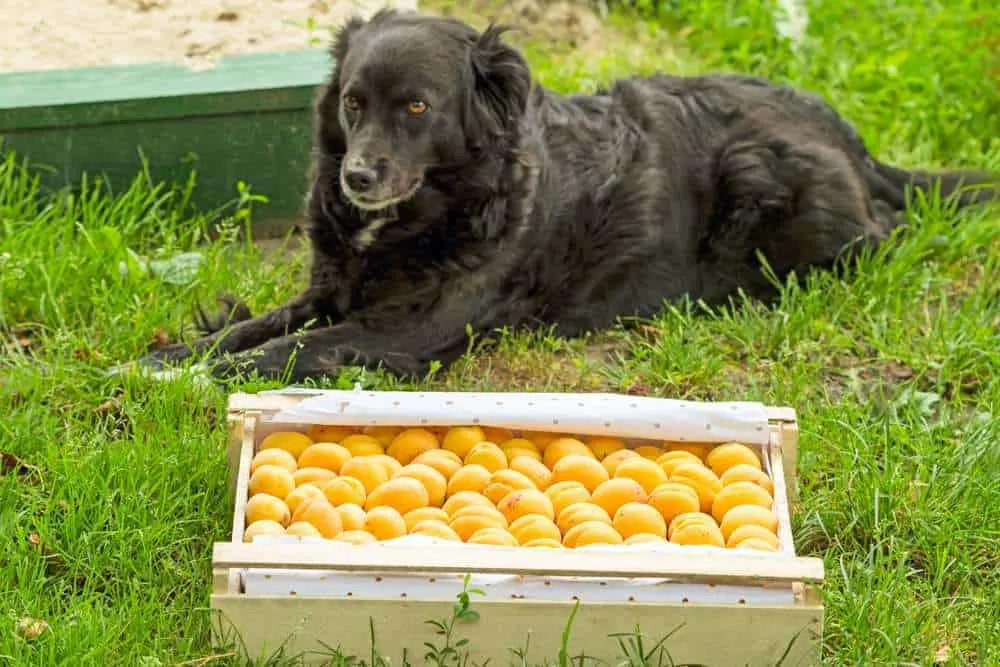
Benefits Of Dogs Eating Apricots
Apricots are super healthy and tasty for humans. This fruit is great even when eaten regularly. The thing is a little different when it comes to dogs, though.
First, let’s check out the nutritional value of 1 cup of apricot, sliced:
| Calories | 74.4 kcal |
| Protein | 2.2g |
| Total carbohydrates | 17.4g |
| Dietary fiber | 3.1g |
| Sugars | 14.3g |
| Vitamin A | 2985IU |
| Vitamin C | 15.5mg |
| Total fat | 0.6mg |
| Vitamin E (Alpha Tocopherol) | 1.4mg |
| Vitamin K | 5.1mcg |
| Niacin (Vitamin B3) | 0.9mg |
| Potassium | 401mg |
We can see in the nutritional table that apricots have many necessary nutrients. It’s good, nutritious fruit, there’s no doubt about it.
However, apricots have a good amount of fiber. It can be great for the human digestive system, but dogs? Not so much – it can result in some intestinal discomfort and indigestion.
Also, apricots have a fair amount of sugar. Sugars have no health benefits to the dog’s health and should be avoided as much as possible.
A lot of sugars can give your dog diabetes, which can result in your dog becoming obese. Now that we’ve stressed how important it is to stick to occasional use, let’s talk about the benefits.
Apricots have a large amount of vitamin A and beta carotene. These are principal nutrients to keep your dog’s vision great for years to come.
Fun fact about vitamin C – dogs don’t need it in their diet! They produce the vitamin C they require, all on their own!
A fair amount of vitamin E in apricots is good for your doggie, too. When the dog eats an apricot from time to time, you will be able to see the benefits.
Vitamin E makes the fur coat shiny and keeps the nails strong. The dog will look better with more vitamin E in her diet!
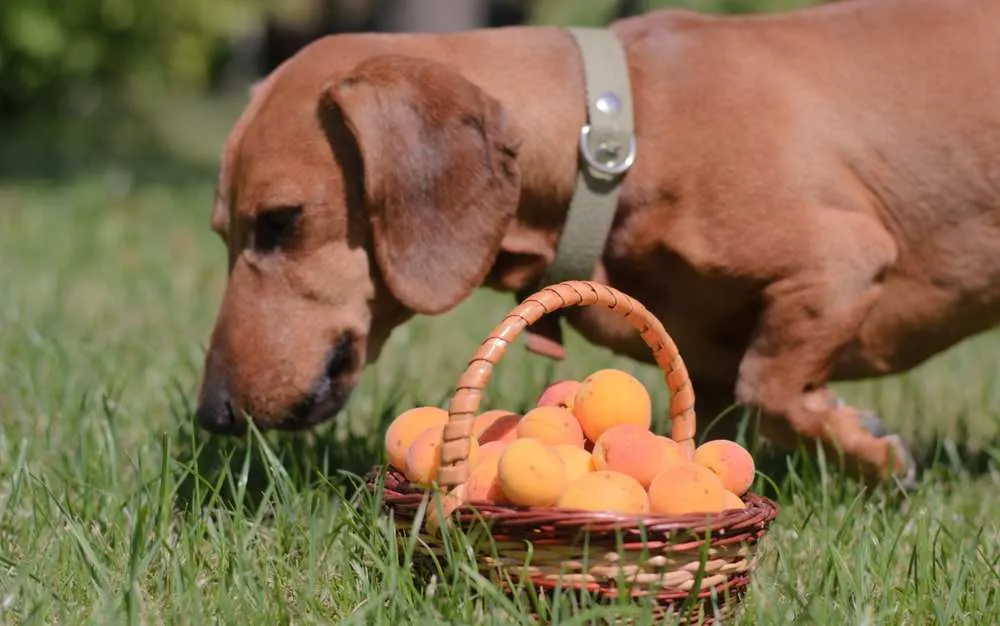
Signs Your Dog Isn’t Feeling Well Due To Apricots
If your dog eats too many apricots, take them to the vet with no exceptions. The dog may be in serious trouble!
The same thing is with dogs that eat the whole apricot. The stem and the pit contain cyanide, we already talked about that.
The trace amounts of cyanide can seriously harm your pup. Please keep apricots away from the dog. If you have an apricot tree in the yard, consider putting up a fence so your dog can’t reach it.
Signs that your dog got apricot poisoning will be noticeable as early as 20 minutes after the dog eats the apricot. So, if you can tell your dog cannot breathe properly, it’s a sure sign that apricots are toxic for your pup.
Also, look for dilated pupils, fatigue, and lethargy. If the dog is usually very playful and vibrant, it will be easy to spot. Make sure to react quickly, because if the dog gets in shock after eating an apricot, she can die!
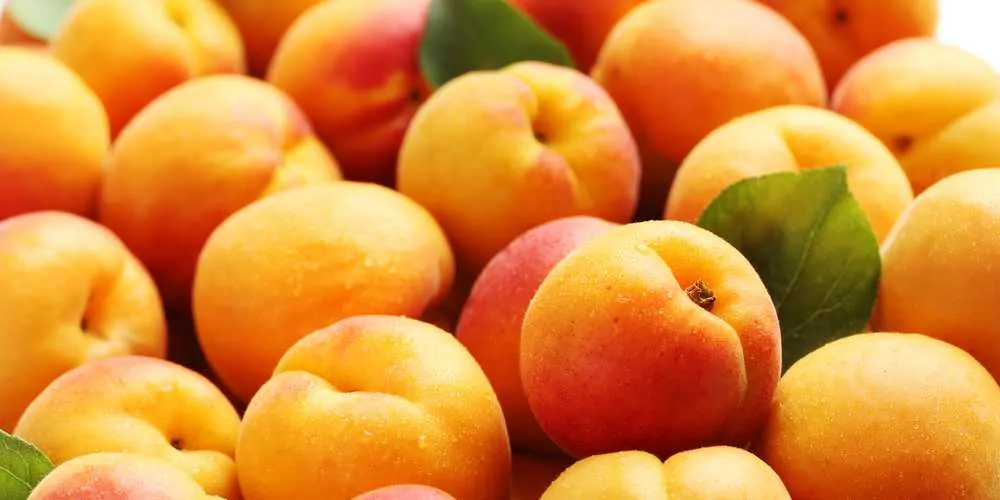
Conclusion
To conclude, dogs can eat apricots. Apricots are safe and healthy for your pup, but only when eaten in moderation.
We already mentioned it, but it’s worth repeating – introduce apricots first. They can be potentially toxic to some dogs, so it’s worth checking out before you go full dose.
Make sure to remove the stem, leaves, and pit. Cut it up in small pieces, so your dog can safely enjoy it.
All in all, apricots have good nutritional value. Eating apricots maintain your dog’s good vision and give them a shiny, fluffy coat of fur – a great fruit, without a doubt!
Learn More: What Can Dogs Eat? A Comprehensive List Of Dog-safe Foods

